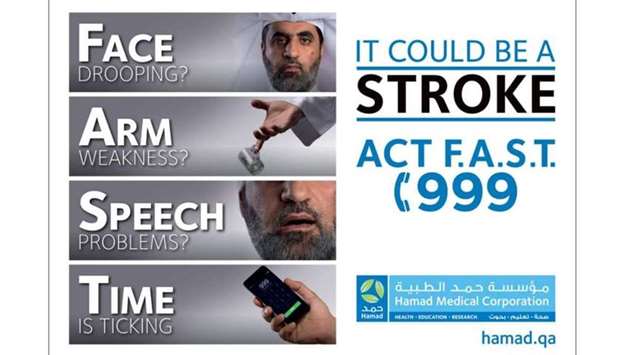On the occasion of the World Stroke Day 2021, Hamad Medical Corporation (HMC) experts are highlighting the importance of acting fast to identify the symptoms.
"A stroke comes on when the brain doesn't get the blood and oxygen it needs. That could be due to a clot, known as an ischemic stroke. Or it can happen with a burst blood vessel, as with a hemorrhagic stroke. Once a stroke begins, you lose almost 2mn brain cells every minute," HMC said in a statement Saturday.
“Every two seconds, someone in the world is having a stroke and it is the second leading cause of death worldwide, and the third leading cause of disability. Globally, one in eight deaths is caused by stroke,” said Dr Ahmad Mohamed, consultant stroke physician, Neuroscience Institute, Hamad General Hospital.
“Due to the high prevalence of many risk factors for stroke – including hypertension, diabetes, high cholesterol, smoking, obesity and inactivity – the incidence of stroke is high. However, the good news is that more people than ever before are surviving stroke.”
He emphasised the speed at which treatment can be given to stroke patients is of the highest importance.
“The more time that passes between the stroke happening and medical intervention, the greater the damage that can be done. The term ‘time is brain’ is frequently used to emphasise the need for fast intervention, as the faster treatment can be given following a stroke, the better the chances of recovery. If you suspect that you, or someone around you, has suffered a stroke, call 999 immediately so that emergency care teams can respond, and treatment can be given as soon as possible,” added the physician.
World Stroke Day is marked globally on October 29 every year and the 2021 theme is “Minutes Saves Lives”. How to respond when one thinks someone is having a stroke can be remembered by the acronym 'FAST' - 'Facial drooping', 'Arm weakness', 'Speech difficulties' and 'Time to call 999'.
“Identifying and reacting to stroke symptoms quickly is crucial to achieving proper treatment for an individual experiencing a stroke,” Dr Ayman Zakaria, senior consultant, Interventional Neuroradiologist at HMC, said. “The treatment options for stroke patients have improved enormously due to the services and technology available at HMC. This includes a dedicated Stroke ward and a state-of the-art Neuroangiography Suite.
“We have a standard of care and acute stroke treatment in the country, which only a few hospitals have in the region. We are seeing increasing numbers of stroke patients and we have worked hard to ensure we provide them with the very best care possible.”
"A stroke comes on when the brain doesn't get the blood and oxygen it needs. That could be due to a clot, known as an ischemic stroke. Or it can happen with a burst blood vessel, as with a hemorrhagic stroke. Once a stroke begins, you lose almost 2mn brain cells every minute," HMC said in a statement Saturday.
“Every two seconds, someone in the world is having a stroke and it is the second leading cause of death worldwide, and the third leading cause of disability. Globally, one in eight deaths is caused by stroke,” said Dr Ahmad Mohamed, consultant stroke physician, Neuroscience Institute, Hamad General Hospital.
“Due to the high prevalence of many risk factors for stroke – including hypertension, diabetes, high cholesterol, smoking, obesity and inactivity – the incidence of stroke is high. However, the good news is that more people than ever before are surviving stroke.”
He emphasised the speed at which treatment can be given to stroke patients is of the highest importance.
“The more time that passes between the stroke happening and medical intervention, the greater the damage that can be done. The term ‘time is brain’ is frequently used to emphasise the need for fast intervention, as the faster treatment can be given following a stroke, the better the chances of recovery. If you suspect that you, or someone around you, has suffered a stroke, call 999 immediately so that emergency care teams can respond, and treatment can be given as soon as possible,” added the physician.
World Stroke Day is marked globally on October 29 every year and the 2021 theme is “Minutes Saves Lives”. How to respond when one thinks someone is having a stroke can be remembered by the acronym 'FAST' - 'Facial drooping', 'Arm weakness', 'Speech difficulties' and 'Time to call 999'.
“Identifying and reacting to stroke symptoms quickly is crucial to achieving proper treatment for an individual experiencing a stroke,” Dr Ayman Zakaria, senior consultant, Interventional Neuroradiologist at HMC, said. “The treatment options for stroke patients have improved enormously due to the services and technology available at HMC. This includes a dedicated Stroke ward and a state-of the-art Neuroangiography Suite.
“We have a standard of care and acute stroke treatment in the country, which only a few hospitals have in the region. We are seeing increasing numbers of stroke patients and we have worked hard to ensure we provide them with the very best care possible.”

